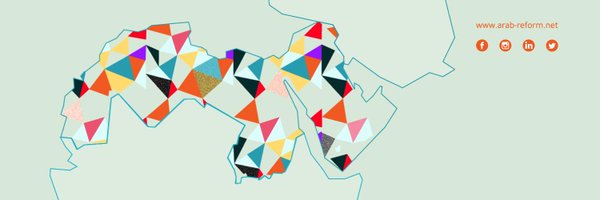
Arab Reform
The conditions that spurred the Arab uprisings, including government corruption, failed economies and deteriorating social services, have only intensified in many countries, exacerbated by 2020’s Covid-19 pandemic, notes analyst Megan O’Toole. The widespread failure of regional governments to tackle these underlying causes has led to Arab Spring 2.0: a new round of uprisings in which protesters demand a better quality of life, she writes for Middle East Eye.
 Marwan Muasher, a former Jordanian diplomat who authored The Second Arab Awakening, tells Middle East Eye: “Arab Spring 1.0 could have resulted in social peace if Arab governments understood the need for new social contracts and the need for more open political systems, and the need to fight corruption institutionally. Most did not choose to do that, and instead they entrenched themselves, and the deep state came back very strongly.”
Marwan Muasher, a former Jordanian diplomat who authored The Second Arab Awakening, tells Middle East Eye: “Arab Spring 1.0 could have resulted in social peace if Arab governments understood the need for new social contracts and the need for more open political systems, and the need to fight corruption institutionally. Most did not choose to do that, and instead they entrenched themselves, and the deep state came back very strongly.”
History is not linear. Revolutions fail; bad guys sometimes win. There is no reason to expect that the next round of Arab uprisings will produce happier results than the previous one. Equally, though, there is no reason to believe the autocrats when they say they can prevent it, the Economist adds.
No cause for celebration – The Arab spring at ten https://t.co/PZt1EKAXuR
— Democracy Digest (@demdigest) December 16, 2020
Ten years after Tunisian street vendor Mohamed Bouazizi set himself on fire in protest against corruption in the country, the anniversary of the so-called Arab Spring generates many a retrospective. The region as a whole is in worse shape than it was a decade ago. It is not more democratic and humane. If anything, autocratic rule seems crueler and more cynical, notes MEMRI analyst Alberto M. Fernandez:
On the plus side, Tunisia itself hosts a fragile democracy, and Sudan is freer today than it ever was under Omar Al-Bashir, and is even attempting attempts a full transition towards democracy. … The regional downside is greater with rivals in Syria, Yemen, and Libya fighting amidst the rubble and ruin, while Lebanon and Iraq are imploding…..An entire generation of heroic Arab activists has been repressed, killed, silenced, or driven into exile. In general, very little has been done to improve the lives of ordinary citizens or enhance their personal dignity.
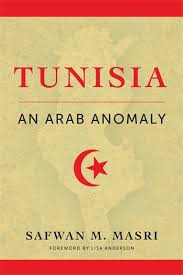 Tunisians are now free to choose their leaders and can publicly criticise the state. Yet for all the chaos they have been through, many people look back on the events of 2010 and regret that their dreams remain unfulfilled. The policewoman who confiscated Bouazizi’s cart 10 years ago still patrols the same streets, moving unlicensed vendors from their pitches, Reuters adds:
Tunisians are now free to choose their leaders and can publicly criticise the state. Yet for all the chaos they have been through, many people look back on the events of 2010 and regret that their dreams remain unfulfilled. The policewoman who confiscated Bouazizi’s cart 10 years ago still patrols the same streets, moving unlicensed vendors from their pitches, Reuters adds:
“Something went wrong in the revolution,” said Attia Athmouni, a retired philosophy teacher who helped lead the uprising after Bouazizi’s death by standing on the fruit seller’s abandoned cart to address the crowd the night he died. …Athmouni believes the answer is more protests. Mass uprisings in Algeria and Sudan ousted entrenched leaders there only last year.
“I’m convinced the revolution is continuous,” he said. “This year the anger is bigger than in the past.”
The easy merger of eras and cultures that makes up modern Tunisia is cited as one of the reasons it has sustained a democratic experiment that elsewhere was short-lived or nonexistent. Analysts also point to its small, apolitical army, and a civil society that found ways to flourish despite authoritarianism, giving the nation ballast when Ben Ali fell. Geography helped, too, the Guardian’s Michael Safi writes from Sidi Bouzid.
“Tunisia* has always been sort of removed from the centre of gravity in the Arab world and was less significant due to its size and lack of natural resources,” says Safwan Masri, a senior research scholar at Columbia University and author of Tunisia: An Arab Anomaly. “It was marginalised by the rest of the Arab world and not significant in terms of larger geopolitical games.”

POMED
Secular liberals failed to present a cohesive front or leadership. Islamists like the Muslim Brotherhood overplayed their hand. Labor organizations, neutered by decades of autocratic rule, couldn’t step up as a powerful mobilizer or political force. It’s perhaps no coincidence that the countries with some success, Tunisia and Sudan, both had strong labor and professional movements, the AP reports.
Rather than real democracy, “my dream before I die is to see less torture, fewer arrests, and a real, better economy,” said Ramy Yaacoub, who was involved in Egypt’s protests and post-revolution politics during the heady days after Mubarak’s fall. “This is as realistic as I can be.”
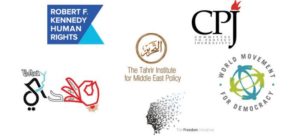 “Change is not overnight. I don’t want to be all wonky and say the French Revolution took decades, but it did. It doesn’t happen over a year or two,” said Yaacoub, who heads the Tahrir Institute for Middle East Studies in Washington.
“Change is not overnight. I don’t want to be all wonky and say the French Revolution took decades, but it did. It doesn’t happen over a year or two,” said Yaacoub, who heads the Tahrir Institute for Middle East Studies in Washington.
Protesters are again raising their voices – but this time, as analysts have pointed out, they have learned key lessons from the past, O’Toole adds:
1. The wall of fear can be broken: One important feature about the 2010-11 uprisings was that they showed the wall of fear that dominates the region could be broken, says Dalia Ghanem, a resident scholar at the Carnegie Middle East Center in Beirut. …”Arab citizens broke the status quo, and that is, by itself, an achievement,” Ghanem says. “Since then, autocrats fell and people woke up and decided that they deserved better, and that the post-colonial social contract was no longer working.[Today] citizens are asking for their place in decision-making and are renegotiating their citizenry. What does it mean to be an Arab citizen?”
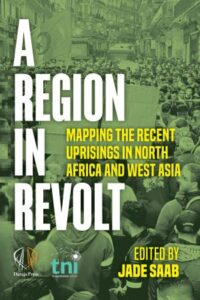 “[The first round of Arab uprisings] helped in the removal of what people in the streets are referring to as ‘the barrier of fear’, the idea that change is possible and should be sought at a fundamental level, that demanding change in living conditions alone is not enough,” said Jade Saab, who edited A Region in Revolt: Mapping the Recent Uprisings in North Africa and West Asia.
“[The first round of Arab uprisings] helped in the removal of what people in the streets are referring to as ‘the barrier of fear’, the idea that change is possible and should be sought at a fundamental level, that demanding change in living conditions alone is not enough,” said Jade Saab, who edited A Region in Revolt: Mapping the Recent Uprisings in North Africa and West Asia.
2. Dominate public spaces: During the Arab Spring, public spaces, such as Cairo’s Tahrir Square, came to symbolise the collective voice of demonstrators. Egyptian protesters occupied the square for more than two weeks amid state-sanctioned violence, including attacks by pro-government protesters on camels and horseback. ..But, Saab says, the idea of what can be achieved through collective public gatherings and presence is still pertinent. The first wave of protests normalised strategies that were then adopted during the second, he notes.
“The most common one is the occupation of public spaces, which became places of creating and revising the identity of the whole nation, as well as a wellspring of art and culture.”
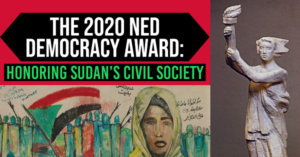 3. Develop social forces: The social protest movements that were active in 2010-11 were understandably under-developed – they had, after all, spent decades in the grip of authoritarian societies….But, Saab says, the events of the Arab Spring helped such groups develop and mature. ..Magdi el-Gizouli, a Sudanese academic and fellow of the Rift Valley Institute, notes that the first cycle of the Arab Spring “ushered in a new type of mass engagement in politics, a pattern of action and a new political vocabulary and grammar of operation”. However….
3. Develop social forces: The social protest movements that were active in 2010-11 were understandably under-developed – they had, after all, spent decades in the grip of authoritarian societies….But, Saab says, the events of the Arab Spring helped such groups develop and mature. ..Magdi el-Gizouli, a Sudanese academic and fellow of the Rift Valley Institute, notes that the first cycle of the Arab Spring “ushered in a new type of mass engagement in politics, a pattern of action and a new political vocabulary and grammar of operation”. However….
“[In Egypt] powerful forces with deep pockets were quick to approbate and subvert the secular themes of the revolution, and indeed soon abolished the liberal freedoms discovered in the moment of revolt,” Gizouli says.
4. Go beyond superficial change: The biggest lesson for protesters in 2020, looking back on events one decade ago, is that genuine change cannot happen overnight. Superficial concessions, such as the replacement of one figurehead with another, do not lead to genuine political reform. Changing to a new political model takes time and consistent pressure.
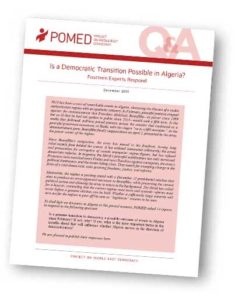
POMED
Khalil al-Anani, a senior fellow at the Arab Center in Washington, says it was notable that protesters in Algeria last year remained on the streets even after former President Abdelaziz Bouteflika left office. “They didn’t repeat the mistakes of their Egyptian counterparts, who left Tahrir Square after 18 days of protests when Mubarak stepped down,” he says. “They insisted on turning power into the hands of civilians, and not to a military leader, which is a crucial step towards the reconstruction of the civil-military relationship in Algeria.”
5. Dig in for the long haul: The latest uprisings in places such as Lebanon and Algeria are anti-neoliberal in nature, Saab says. They are learning the lessons of what happened in 2010-11 in Tunisia, which was able to achieve democracy but is still plagued by the economic problems that afflicted the old regime…. “Unrest is what gives rise to social movements, and not vice versa,” he says…. Anani predicts that young people will likely “flood the Arab streets once again whenever they have the opportunity to do so, and will remain rebellious until their demands for freedom, justice, dignity and representation are met”.
“The bullet of change has already been fired in 2011,” he says, “and it is only a matter of time when it will hit.”
 The Arab Spring had a learning effect for African countries away from decades of authoritarian regimes towards more freedom, analysts told Deutsche Welle:
The Arab Spring had a learning effect for African countries away from decades of authoritarian regimes towards more freedom, analysts told Deutsche Welle:
In Senegal, the youth movement “Y’en a marre” [a NED partner] successfully fought against the constitutional court’s decision in 2012 to allow President Abdoulaye Wade to run for a third time. And in Sudan, President Omar al-Bashir was ousted from office in 2019 after months of civil unrest.
“I believe that many African movements that advocate for democracy and more openness were emboldened by what had happened in North African countries and the Middle East,” German-Africa analyst Robert Kappel told DW. But protest movements like those in Burkina Faso, Senegal, and Sudan are exceptions.
“There was already a great wave of democratization in sub-Saharan Africa to the extent that there was no need to break up region-wide authoritarianism,” says Matthias Basedau, director of the GIGA Institute for African Studies.
Egyptian activist Nancy Okail, who has spent much of the past eight years in exile after being accused of receiving foreign funding in her role as director of the human rights organisation Freedom House, said despite the setbacks all she had fought for had been “totally worth it”, the Guardian adds.
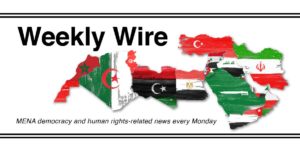
Credit: POMED
“We have had some small wins and are still fighting battles,” she said. “Though the longer things stay like this, the more difficult it will be to rescue the country. For the sake of human rights and democracy we should not just rely on governments to change things. We need stamina and we need different approaches. This is where real change happens.”
*Get regular Tunisia updates from NED partner POMED.







